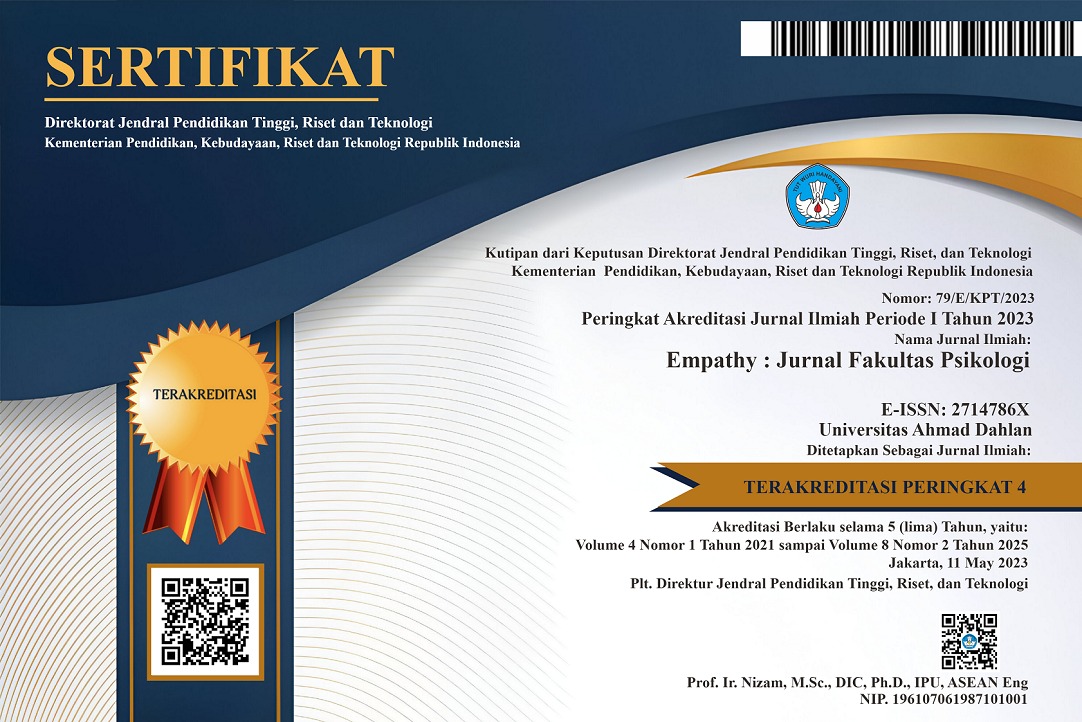The Sense of Humor Scale: Psychometric Studies on Banjar Ethnic Students
DOI:
https://doi.org/10.12928/empathy.v6i1.26686Keywords:
Banjar ethnic, Sense of humor scale, Reliability, ValidityAbstract
Skala Kepekaan Humor (SKH): Studi Psikometrik pada Mahasiswa Etnik Banjar
The focus of this study contributes to adding reference to the psychometric property of the Sense of Humor Scale (SKH) which aims to be a culturally fair test. The type of validity used is content validity (logical type) and estimated reliability using the internal consistency method. A total of 50 Banjar ethnic students were the research subjects obtained by the convenience purposive sampling method. The reliability coefficient (alpha) for the violence component was 0.916, the annoyance component was 0.872, the parody component was 0.888 and the creativity component was 0.845. Selection of the initial 76 items of SKH resulted in 64 items that had been adjusted to the proportions of the components in the blue print, the lowest item discrimination power index (rit) was 0.281, the highest was 0.747 and the mean was 0.521. The reliability coefficient of the SKH composite score (Mosier formula) is 0.944, meaning that 94.4% is a pure score for the subject group (5.6% of the difference in the apparent score is due to variations in measurement errors). It was concluded that the results of a psychometric study of SKH in ethnic Banjar students showed empirical evidence that SKH is a valid and reliable measure of humor.
References
Hasanat, N.U. & Subandi. (1998). Pengembangan alat kepekaan terhadap humor. [Adobe Digital Editions version]. Retrieved October, 09, 2018, from https://jurnal.ugm.ac.id/jpsi/article/view/9897/7450
Utomo, U.H.N. (2020). Apresiasi skala kepekaan humor pada etnik Jawa, Madura dan Sunda. Jurnal Psikologi Terapan dan Pendidikan, Vol. 2, No. 1, 9-20. http://dx.doi.org/10.26555/jptp.v2i1.17008
Utomo, U.H.N. & Masrun. (2006). Validitas dan reliabilitas skala kepekaan terhadap humor. Tesis (tidak diterbitkan). Magister Sains Psikologi Universitas Gadjah Mada. https://etd.repository.ugm.ac.id/penelitian/detail/30058
Triyantoro, D.B. (2014). Validitas dan reliabilitas skala kepekaan humor versi A-B pada mahasiswa etnik Jawa. Skripsi (tidak diterbitkan). Fakultas Psikologi Universitas Ahmad Dahlan. https://digilib.uad.ac.id/penelitian/Penelitian/detail/73092
Abdullah, A.I . (2014). Validitas dan reliabilitas skala kepekaan humor versi A-B pada mahasiswa etnik Bugis. Skripsi (tidak diterbitkan). Fakultas Psikologi Universitas Ahmad Dahlan. https://digilib.uad.ac.id/penelitian/Penelitian/detail/72839
Parianti, Y. (2014). Validitas dan reliabilitas skala kepekaan humor versi A-B pada mahasiswa etnik Sasak. Skripsi (tidak diterbitkan). Fakultas Psikologi Universitas Ahmad Dahlan. https://digilib.uad.ac.id/penelitian/Penelitian/detail/72841
Susanti, S.V.T. (2014). Validitas dan reliabilitas skala kepekaan humor versi A-B pada mahasiswa etnik Sambas. Skripsi (tidak diterbitkan). Fakultas Psikologi Universitas Ahmad Dahlan. https://digilib.uad.ac.id/penelitian/Penelitian/detail/125836
Yusnita, H. (2014). Validitas dan reliabilitas skala kepekaan humor versi A-B pada mahasiswa etnik Madura. Skripsi (tidak diterbitkan). Fakultas Psikologi Universitas Ahmad Dahlan. https://digilib.uad.ac.id/penelitian/Penelitian/detail/72963
Kusumasakti. W. (2015). Validitas dan reliabilitas skala kepekaan humor versi A-B pada mahasiswa etnik Sunda. Skripsi (tidak diterbitkan). Fakultas Psikologi Universitas Ahmad Dahlan. https://digilib.uad.ac.id/penelitian/Penelitian/detail/74922
Fitriani, A. & Hidayah, N. (2012). Kepekaan humor dengan depresi pada remaja ditinjau dari jenis kelamin. Jurnal Humanitas, 9 (1): 76-86. http://dx.doi.org/10.26555/humanitas.v9i1.351
Febriana, I. (2014). Pengaruh kepribadian dan sense of humor terhadap psychological well-being (Studi pada jurnalis di DKI Jakarta). Skripsi. (dipublikasikan). Fakultas Psikologi Universitas Islam Syarief Hidayatullah. http://repository.uinjkt.ac.id/dspace/handle/123456789/27245
Hartanti (2008). Apakah selera humor menurunkan stres? sebuah meta analisis. Anima, Indonesian Psychological Journal, 24 (1), 38-55. http://repository.ubaya.ac.id/id/eprint/37453
Martin, R. A. (2007). The psychology of humor: An integrative approach. Elsevier. https://doi.org/10.1016/B978-012372564-6/50024-1
Wong, Y.M. (2010). Humor styles, social competence and loneliness: a study among 337 youngsters in Hong Kong and Hangzhou. City University of Hong Kong Department of Applied Social Studies. http://lbms03.cityu.edu.hk/oaps/ss2010-4708-wym749.pdf
Sarwono, S. W. (2014). Psikologi Lintas Budaya. PT Raja Grafindo Persada.
Sahriansyah. (2015). Sejarah Kesultanan dan Budaya Banjar. Aswaja Pressindo.
Wikipedia https://id.wikipedia.org/wiki/Madihin
Sudjana, N. (2004). Dasar-dasar proses belajar mengajar. Sinar Baru Algensido Offset.
Sugiyono. (2014). Statistika untuk penelitian. CV. Alfabeta.
Azwar, S. (2012a). Reliabilitas dan validitas (edisi ke-4). Pustaka Pelajar.
Suryabrata, S. (2004). Pengembangan Alat Ukur Psikologis (Edisi II). Penerbit Andi.
Azwar, S. (2012b). Penyusunan skala psikologi (edisi ke-2). Pustaka Pelajar.
Azwar, S. (2015). Dasar-dasar psikometri (edisi ke-2). Pustaka Pelajar.
Downloads
Published
Issue
Section
License
Authors who publish with Empathy: Jurnal Fakultas Psikologi agree to the following terms:
- Authors retain copyright and grant the journal right of first publication with the work simultaneously licensed under a Creative Commons Attribution License (CC BY-SA 4.0) that allows others to share the work with an acknowledgment of the work's authorship and initial publication in this journal.
- Authors are able to enter into separate, additional contractual arrangements for the non-exclusive distribution of the journal's published version of the work (e.g., post it to an institutional repository or publish it in a book), with an acknowledgment of its initial publication in this journal.
- Authors are permitted and encouraged to post their work online (e.g., in institutional repositories or on their website) prior to and during the submission process, as it can lead to productive exchanges, as well as earlier and greater citation of published work.

This work is licensed under a Creative Commons Attribution-ShareAlike 4.0 International License.



